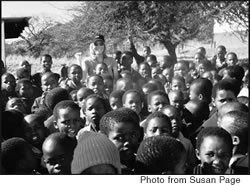The Tsunami Of Poverty In Africa

Wednesday - August 03, 2005
| Share
 Del.icio.us
Del.icio.us
The AIDS pandemic in Africa is creating an
ever-expanding number of orphaned children
This is the second column in a series on Africa. Having just been in Swaziland, a small kingdom landlocked by neighboring South Africa and Mozambique, I am impassioned to share what I witnessed.
Why? What bearing does a continent literally half a world away have on us here in Hawaii? We have our own poor and victimized — and our own family needs, too.
Well, besides a Supreme calling to go out in the world and help the most helpless, there are devastating geo-political ramifications of ignoring the woeful plight of Africans today.
First, let me tell you about an orphanage our Hawaii Dream for Africa (dreamforafrica.org) group visited on a day we weren’t planting vegetable gardens in the remote tribal regions of Swaziland.
My mind envisioned an institutional sort of building with bunkstyle beds and a communal kitchen serving up hot meals. So dead wrong. Our van drove up to a small sloping field of red dirt and rock. There was one tree (like a small kiawe). Under this tree, I was told, a “gogo,” or grandmother, had been caring for an ever expanding number of homeless toddlers and children for months through wind, rain, cold and heat, until just recently when someone donated two small log rooms. Anywhere there are orphans and an adult in charge is an orphanage, shelter or no shelter.
An old iron pot on an open wood fire was the “kitchen.” The children, 20 or so, threadbare and filthy, sat on tattered mats on the dirt. No ball to throw or book to read. Three teenage girls, who can’t afford the $70 or so it costs to go to school, help stir and serve the boiled cabbage for lunch and hold the little ones. One 15-yearold girl named Nontobeku Sigandze isn’t an orphan, but her parents have both died — most likely of AIDS.
“I had to drop out of school,” she shyly admitted in perfect English. “My grandmother doesn’t have the money to send me. I want to go to school. I want clothes to wear.”
School offers hope. Yet only 50 percent of the kids there can go. School may keep Nontobeku from becoming a prostitute, which so many young girls turn to in order to survive. However, school isn’t always a safe haven. Many of the children in school are orphans so sometimes their teacher helps — for a price.
Until recent exposure, many male teachers forced sex on their students, even as young as 9 or 10, for the promise of grades, a uniform or tuition. An entire faculty of male teachers was fired by Swaziland’s Education Department after frightened children testified. The government newspaper still doesn’t call it what it is: rape. It’s referred to as sexual harassment. What’s worse, the second highest infectors of HIV/AIDS are schoolteachers. (The first is men who go to find work in South Africa, where they have sex with HIV infected prostitutes, most just starving children made homeless by parents infected. The infected men return home and infect their wives — and sometimes their daughters, a culturally accepted practice.)
The cycle of infection is now spiraling toward a crisis — a pandemic — unlike any in modern time. Misinformation, wild rumor and denial about AIDS fuel its escalation. AIDS in Africa is not predominately a homosexual disease as it is in the U.S. It’s not cured by having intercourse with an infant or a virgin. It is not a curse put upon a family by the dead ancestors. It is an infectious disease spread by having sex and by poverty, hunger, orphans, ignorance and lack of selfrestraint.
Here’s a quiz:
How many people died in the tsunami on Dec. 26, 2004 in Southeast Asia?
Answer: More than 225,000.
Approximately 356 people die every hour of HIV/AIDS in Africa. How many is that per day?
Answer: 8,544 people.
Every 26 days, 225,000 people die of AIDS in Africa — a tsunami- sized disaster. As of Aug. 1, 1,871,136 people have died of AIDS since the tsunami.
Fifteen million young children are living on the streets today, orphaned because of AIDS. World Health Organization (WHO) predicts there will be 43 million by 2010.
Once we know the truth, can we turn a blind eye? But what can we do? Support and/or participate in (Go there!) organizations like Christian-based Dream for Africa, which offer practical solutions for fighting hunger, AIDS education (highly successful “Beat the Drum” program in Swaziland and South African schools) and orphanage building. Write your representatives to take seriously this unprecedented disaster. Don’t lose hope. Pray for Africa.
Next week: How the pandemic in Africa affects our safety in America
E-mail this story | Print this page | Comments (0) | Archive | RSS Comments (0) |
Most Recent Comment(s):
Commenting is not available in this weblog entry.












